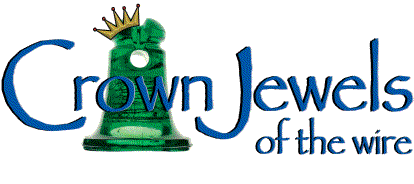Me And The 143 (#15)
by Grant Salzman, NIA #1785
Reprinted from "INSULATORS - Crown Jewels of the Wire", November 1981, page 15
As we approach the end of
this series of articles, I would like to introduce you to one of the most
unusual 143's ever made, and some that might be rather controversial.
Have you
ever heard of a "Double-Threaded Insulator"? Many people will not
understand what that means. You see, most insulators are "threaded".
They have a groove inside that is really one long ridge or groove that spirals
down. But long ago in Canada some unknown company made insulators that had a
variety of pin holes, including one that had two ridges that spiraled down.
Because the pin hole has two ridges that descend, they must spiral down at a
sharper angle than the usual threaded type.

(Drawing is by Clay Salzman)
After a while, you will get to where
you can spot these quickly. Because of the special grooving, they will not work
on a regular pin. I have never seen a double threaded pin used by these, but it
would be quite a prize if anyone had one.
I mentioned that the same insulator
was made with a variety of pin holes, including single-threaded,
double-threaded, and threadless! They were obviously made during the era when
threadless were going out of style, but when there was still a market for
threadless replacement items as well as for threaded and other styles.
I group
all of these items into Mold Style #8. All are no-name items, and the height of
the insulator varies considerably. In fact, I have seen some of them that were
almost one-fourth inch shorter than a regular 143, although most are about
one-half inch taller. Which brings us to the controversial part! Some people
consider these to be CD 143.4. The larger ones look just like a CD 145, except
they have no inner skirt. I personally consider them to be 143's, and I don't
think the height itself should warrant a new CD number just like the CEW and
E.C.&M.
Now remember that I mentioned threadless? I think the same
company that made these threaded insulators also made the CD 730, the threadless
version of the 143! However, perhaps we will never know for sure.
Mold Style #8
comes in two major shapes, with lots of minor variations, especially in the
threadless varieties. Also remember that long pours and short pours are rather
common, so the height will vary considerably.
Mold Style #8A has a wire groove
that is slightly over one-fourth inch wide, and the body and sides taper
somewhat.
|
1.
|
No embossing.
|
|
|
MLOD.
|
|
|
Threadless.
|
|
|
Aqua, light green.
|
2.
|
No embossing.
|
|
MLOD.
|
|
Threaded.
|
|
Aqua, medium purple, royal purple.
|
3.
|
No embossing.
|
|
MLOD.
|
|
Double
hyphen threaded.
|
|
Aqua, blue, green, yellow.
|
Mold Style #8B is very similar,
except that the wire groove is larger (slightly over three-eighths of an inch).
The skirt sides are generally straight, and the dome gives the entire insulator
a "chubby" look!
4.
|
No embossing.
|
|
M.LD.
|
|
Threadless.
|
|
Aqua, green.
|
5.
|
No
embossing
|
|
MLOD.
|
|
Threaded.
|
|
Aqua.
|
Prices: Threadless are still very desirable, and
the CD 730 is no exception. However, it seems to be much more available back
East than it is in the western parts of the country. The double threaded variety
is also good, especially the green and yellow varieties. Even the single
threaded types are tough to get, especially the purple ones.
| 